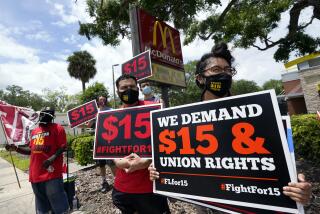Protecting workers’ 401(k) plans
- Share via
The shift by many employers from providing pensions to offering 401(k) plans has forced workers to take more responsibility for their retirement savings, but left them ill-equipped in some ways to protect themselves. Two developments in recent weeks should help improve the situation: The Department of Labor issued long-delayed rules to help employers do a better job of sifting through the piles of fees charged by investment firms bidding for their 401(k) business, and a federal judge in Los Angeles ruled that employers can be held liable when they don’t ask investment firms for a better deal when one is readily available.
Federal law requires employers that offer “defined contribution” plans such as 401(k)s to act in the best interests of the workers who invest in them. One challenge has been the limited amount of information that Wall Street firms disclose about the sums they spend on bookkeeping, marketing and other expenses. Those expenses reduce the return investors receive on their money, and they can add up to thousands of dollars in lost savings over time.
Investment companies have long provided estimates of their annual operating expenses, but there’s so little detail about where the money goes, it’s hard to tell which ones are spending prudently. The new Labor Department rules, which are due to take effect next July, would require employers that offer 401(k) plans to be provided more detailed and standardized disclosures, which should help them make better judgments when picking the options to offer workers.
The rule doesn’t require employees to have access to that information, however — a puzzling shortcoming that Congress should fix. The more people know about the expenses that eat into their retirement savings, the better choices they’ll make about how much to save and where to invest.
A more fundamental limitation for employees is that their 401(k) plans may be more attractive financially than relying on individual retirement accounts, but their investment options in a 401(k) are controlled by their employer. District Judge Stephen K. Wilson gave employees a small but important bit of protection last month, ruling that Edison International violated its duty to workers when it included in its 401(k) the more expensive retail version of three funds that also were available as lower-fee “institutional” offerings. The problem, Wilson said, was that Edison’s retirement planning contractor didn’t even ask the fund providers for the lower-cost products. The ruling should help make employers and their retirement contractors pay more attention to the value workers are getting for the money they’re investing in their retirement plans.
More to Read
Inside the business of entertainment
The Wide Shot brings you news, analysis and insights on everything from streaming wars to production — and what it all means for the future.
You may occasionally receive promotional content from the Los Angeles Times.










